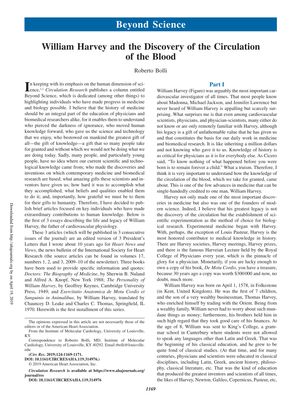William Harvey and the Discovery of the Circulation of the Blood
April 2019
in “
Circulation Research
”

TLDR William Harvey is recognized for discovering blood circulation and pioneering experimental medicine.
The document discusses the life and legacy of William Harvey, who is credited with the discovery of the circulation of the blood and is considered the father of cardiovascular physiology. The author, Roberto Bolli, emphasizes the importance of understanding the history of medicine and the contributions of individuals like Harvey to the field. Harvey's discovery is highlighted as one of the few advances in medicine that can be attributed to a single person. Moreover, Harvey's establishment of scientific experimentation as the method for biological research is considered his greatest legacy, marking the beginning of experimental medicine. The document also provides a brief biography of Harvey, detailing his education, career, and the influence of his mentor Hieronymus Fabricius, who inspired Harvey to investigate the function of valves in veins, leading to his discovery of blood circulation. Harvey's book "De Motu Cordis" is mentioned as a valuable treasure, and his other achievements, such as his positions and honors, are also noted. Harvey died at the age of 79 in 1657, having made significant contributions to medical knowledge and scientific methodology.